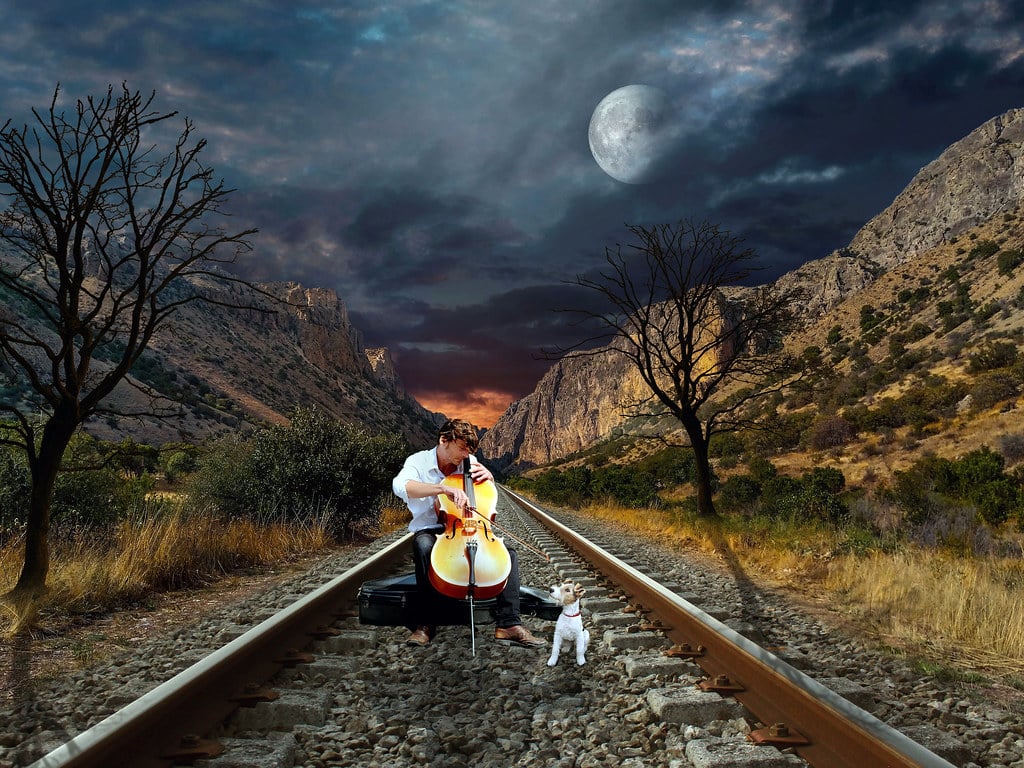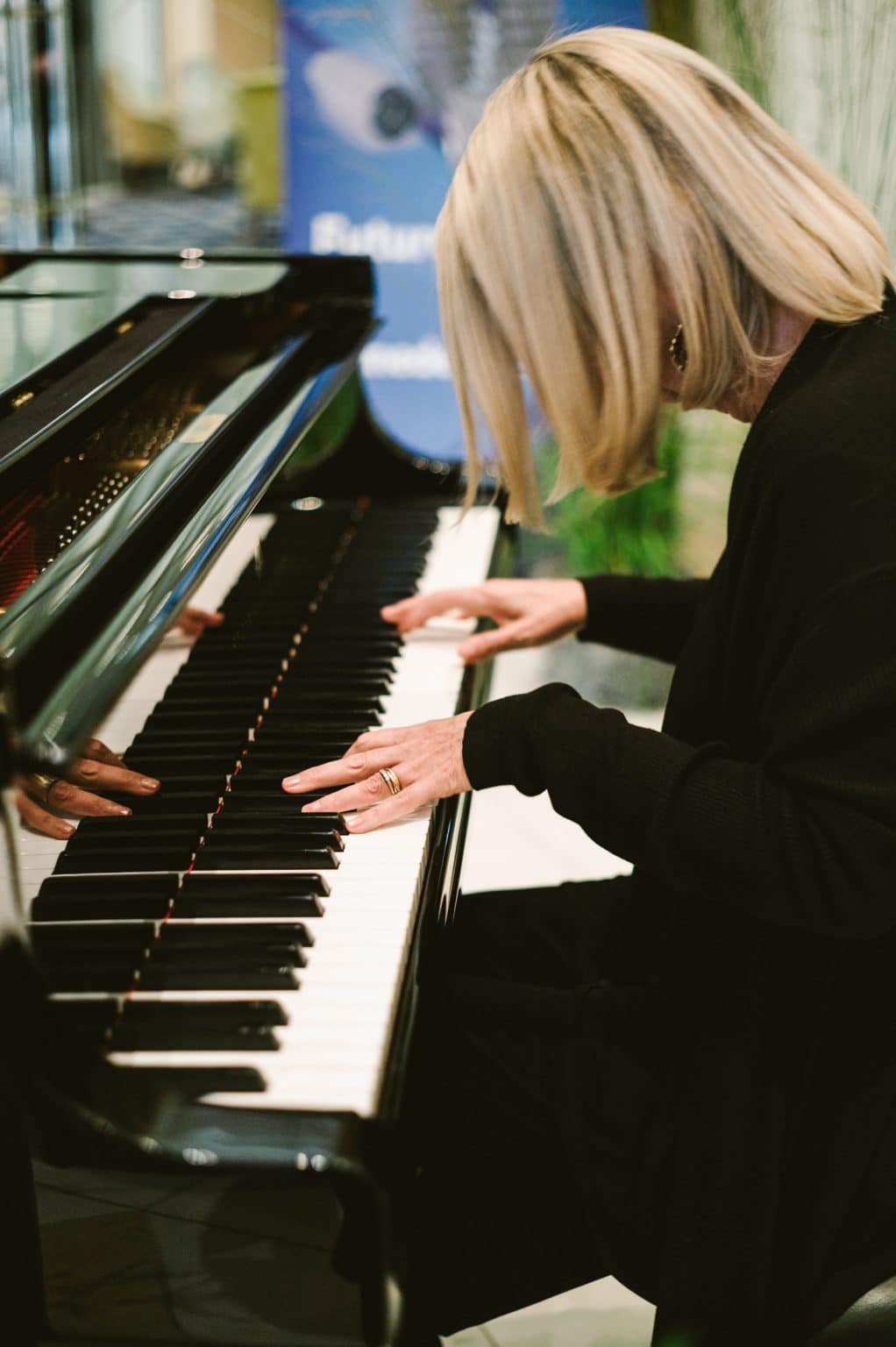Robin Meloy Goldsby is a pianist and the author of Piano Girl (Backbeat Books). She has appeared on National Public Radio’s All Things Considered and Piano Jazz with Marian McPartland.
We are the crooners, the head-bangers, concert stage artists, beer hall grinders, swinging jazz trios, choir accompanists, big band soldiers, guitar-strumming folksingers, hotel ambient players, Broadway pit veterans. We are the buskers, boppers, and bewildered career performers currently pivoting on the precipice of a new era.
Professional freelance musicians face an uncertain future. Even if society returns to its fast-paced tempo, we will likely encounter closed venues, germophobic fans, and a beaten down audience with no disposable income to afford the luxury of an evening out.
Like it wasn’t already difficult enough to make a living as a musician.
The overabundance of free content online gives the general impression that we happily share our art form because we love what we do. That’s partially correct, but it’s not the whole story. We might play to challenge ourselves, unbreak our broken hearts, or carve out a corner of harmony in a dissonant world. But we also play to pay the bills.
Check out the richness of the artist livestream menu and you’ll see everything from desperation to generosity, often served up as a combination of both. Some of us dabble in monetizing the livestream market because we have families to feed, mortgages to pay, children to clothe and educate. Others showcase their talents in exchange for applause and recognition, or to stay on the radar of a general public that has the attention span of a fruit fly. Some of us don’t need the money (yet) or the praise but crave the human connection we make when performing for a live audience.
It turns out that most of us have been living on the edge for a very long time, even those who seem successful. A busy touring musician, one who relies on live performances to make her living, can suffer the sting of a season’s cancellations and hang in there financially for a few months. Maybe the A-listers can hold out for a few years. Maybe. The lucky among us have tenured teaching positions or full-time orchestra contracts to cushion the blow, at least for the time being. But those of us without a regular paycheck are now scrambling for every dollar—relying on the virtual tip jar, a GoFundMe campaign, a Patreon house of cards, or the benevolence of strangers who have the resources, good taste, and compassion to understand that live music delivers a vital link to our own humanity.
We create art, we compose soaring melodies and intricate bass lines that paint acoustic portraits of empathy, beauty, ugliness, and grace. This ability separates us from a every other form of life on the planet. Last time I checked, a troop of macaques, gregarious as they might be, were unable to perform or appreciate a Mozart string quartet, a burning version of “Cherokee,” or a choral version of the seemingly never-ending verses of a Dylan tune.
Is music essential? Yes, no, maybe. Depends who you ask. Music has never been essential for keeping people alive, but it has always been essential for helping us feel alive. Live music connects us in an impeccably human way. We use our 10,000 hours of practice (20,000 for the over-achievers among us) to tap into universal emotions, shout out the inequities of society, bask in our loneliness, celebrate freedom or recovery or victory, knock down walls or poke holes in plexiglass ceilings, to remember, to dream, to keep moving forward. That’s what live music does—sometimes, but not always. When it’s magical, it’s magical.
We get it. Musicians are not essential like frontline medical workers, sanitation employees, or people who bravely go to work every day so that the rest of us can purchase toilet paper, cake ingredients, or a jug of vodka. The truly essential workers are the brave folks who ensure that musicians can stay home, practice, and dream of a time when we might return to the handful of venues that have weathered the Corona storm.
So what do we do while all this weathering is going on? Any level of musician can click “Go Live” and open themselves up to a worldwide audience. We can livestream to our heart’s desire. But truth be told, our hearts aren’t much in it. At least, not yet. Now what? Pivot, some might say. Come on, we’re good at this. Musicians are experts at pivoting, sidestepping, and leaping through flaming hoops. Most of us have been fired and hired more times in year than most people are in a lifetime.
Quarantine? No problem. We’re accustomed to solitude; we actually enjoy lonely hours in a practice studio immersed in musical challenges large and small. We know about the dark hole of unemployment, the downward spiral of uncertainty, the futility of shining an aural sliver of light into a boomy, gloomy world. We’re well-equipped to fight the creeping sense of worthlessness that raises its dissonant voice every now and then. Will we really be defeated by a virus that may have been caused by a horseshoe bat, or a butt-ugly pangolin, or a biological warfare lab? Not likely.
Right now, we’re scuffling to support our families, just like you and everyone else. We are angry, unsettled, scared, sleeping poorly, and making do with ramen noodles and day-old banana bread. But in the middle of all this, some musicians are rising—tossing online bouquets of song to the outstretched hands of you, our sequestered sisters and brothers, our treasured audience that lives on in our wildest, happiest dreams.
I think about the Titanic band, the most famous group of anonymous musicians in the history of anonymous musicians, and how they played through their repertoire of popular songs as the ship slowly sank into icy water. Those eight courageous players, all of whom set sail on the Titanic as second-class passengers, played until the very end, providing a real-life real-death sound track that has been romanticized for decades.
Let’s name the musicians, shall we? Theodore Ronald Brailey, Roger Marie Bricoux, John Frederick Clarke, Wallace Hartley, John Law Hume, Georges Alexandre Krins, Percy Cornelius Taylor, John Wesley Woodward. They ranged in age from twenty to thirty-three years old. Why did they keep playing as the ship went down? Was it a sense of duty, the genuine desire to calm passengers being lowered into lifeboats and bring peace to those—like themselves—left stranded on deck? Or did they keep playing because they hoped the denizens of society (the ones in the lifeboats) would recognize artistry in the face of calamity? Maybe they thought that rescue—even for those in steerage class—was a possibility, that the next gig on the next ship was right on the other side of that pesky iceberg.
Musicians have always been ridiculous optimists. We have to be.
The family of one of the Titanic musicians, months after the tragedy, received a bill from the shipping company, asking them to pay for the rental of his uniform.
Even in the most turbulent times, even when faced with an iceberg of daunting proportions, musicians continue to believe that if we do what we do well, eventually someone will pay us. There’s not yet a clear business model as to how we’ll make a living during this mess—or even on the other side of it—but we are resourceful. The vast Internet is full of unchartered opportunity to monetize what we do and still find a connection to our audience.
Maybe we’re part of an unwelcome digital Darwinian experiment. Some of us—those too old-school, tired, or jaded to learn new technologies—will drop out, find another way to make a living, or spend the rest of our lives reminiscing about the good old days. But some of us will conquer the livestream, the interactive concert, the sponsorship scheme. Most of us will hope for redemption and muster the courage to keep playing while the ship sinks, because it’s what we do best.
Is our collective virtual tip jar half full or half empty? Do we even own a fucking tip jar?
My last gig was March 15th, at Excelsior Hotel Ernst in Cologne, Germany where I’ve been performing for the last five years. As usual, I played solo piano music for a grateful audience of guests of all ages, most of them enjoying one last outing a few hours before the enforcement of Angela Merkel’s lockdown orders. I played music from my Magnolia album along with a few standards and closed the set with Billy Joel’s “And So It Goes.” We already seemed nostalgic for something we knew was slipping away—the chance to gather, listen to music, remember, forget, drift. My guests were strangers to me, but for the three hours we spent together that afternoon, we bonded. Maybe it was even a little magical.
I could have played the Titanic theme, but I didn’t.
When I covered the Steinway and left the hotel, part of me knew that I was likely walking away from a joyful forty-five-year career in live music, one that has grounded me, given me wings, and provided a livelihood for my family. But the survivor part of me, the Pollyanna Piano Girl who has never lost faith in the ability of music to unite hearts and minds, resorted to talking out loud to the piano.
“Don’t worry,” I said, “I’ll be back.”
**
Robin Meloy Goldsby is a Steinway Artist. She is the author of Piano Girl; Waltz of the Asparagus People: The Further Adventures of Piano Girl; Rhythm: A Novel. New: Manhattan Road Trip, a collection of short stories about (what else?) musicians. Go here to buy Manhattan Road Trip.
Robin’s music is available on all streaming platforms. If you’re a Spotify fan, go here to listen. NEW! Listen to the Piano Girl Podcast. Stories, music, fun. Do you play the piano? Check out Robin’s solo piano sheet music here, including her popular arrangement of the Pachelbel Canon in D.

